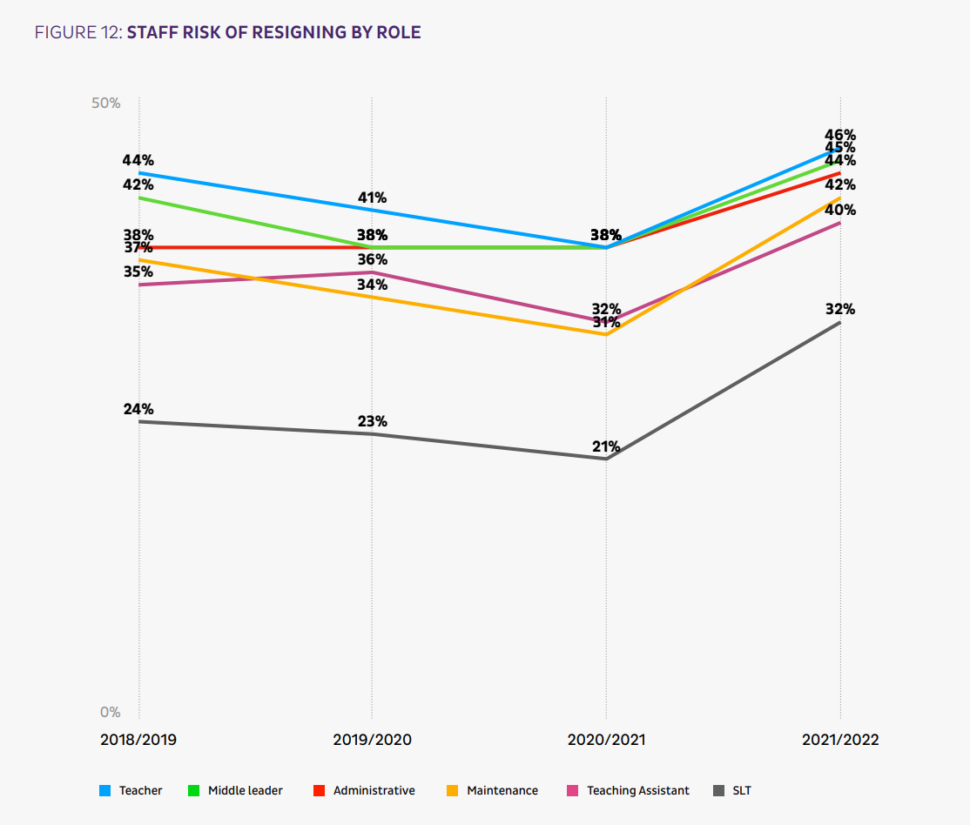The proportion of senior school leaders considering leaving their jobs has leapt by over 50 per cent in just one year, reversing a downward trend seen during the Covid pandemic.
Data from a survey of 25,000 academy staff by Edurio shows the proportion of all employees considering resigning rose to 42 per cent in 2021-22, up from 34 per cent in 2020-21, and higher than the pre-pandemic rate of 39 per cent.
Around four in 10 staff who are considering resigning would leave the profession, the research found. Secondary staff were also more likely to consider leaving (44 per cent) than primary (38 per cent).
The proportion of staff at risk of resignation rose for all roles, but the most pronounced increase was among senior leaders.
In 2021-22, 32 per cent said they were considering leaving, up from 21 per cent last year and 24 per cent pre-pandemic.
Paul Whiteman, general secretary of the NAHT school leaders’ union said the figures were “demonstrative of the retention crisis that is afflicting our profession”.

“It is clear that stagnant pay, in combination with high stakes accountability, crushing workload, long hours, and inadequate school funding, is driving teachers from the job they love.”
It comes after Schools Week revealed last year that two in five headteachers planned to leave the profession early within the next five years, with the most experienced leaders twice as likely to be plotting their exit.
At the time, headteachers told this newspaper they were “exhausted” and at risk of “absolute burnout”.
This week’s new data presents further evidence of a crisis in school leadership, suggesting any slight improvement in retention caused by the pandemic and resulting financial uncertainty is now cancelled out.
The Edurio report found that while it was “possible” the changing figures could be explained by staff deferring their decisions to leave because of loyalty to their school or the “unsteady” labour market, there were “some patterns in risk of resigning that do not fall in this area”.
The increased risk of resigning among senior leaders is a “key concern that requires attention”.
The report added that “leadership dynamics in a school have the strongest relationship with staff decisions to remain in the school or leave it.
“There is a risk that increased turnover of leadership may exacerbate the staff turnover in schools and, as leaders play a central role in building their teams, this may also affect schools’ ability to recruit new staff well.”
Geoff Barton, from the ASCL leaders’ union, said he had “repeatedly warned the government of the impact on senior leaders of the intolerable and unsustainable pressures of an excessive accountability regime and mountainous workloads”.
“The Edurio report now lays bare the consequences of this situation with the proportion of senior leaders who are considering resignation having increased by a third compared to pre-pandemic.”
Barton also said it was “deeply worrying” that more education staff in general were considering leaving than before the pandemic “doubtlessly because of the pressures on schools combined with government-directed pay erosion”.
“Given that initial teacher training targets are also being missed it is very likely that teacher shortages will worsen.”








It’s time for the government to stop turning schools into processing plants where noone dares to speak out. More and more autonomy is being taken from teachers and school leaders, who are just becoming cogs in a machine run by people who have little or no teaching and learning expertise, but love being in control. As far as schools go, big is ugly, very ugly. If we are to provide the sort of learning environment where our children and in turn our country, can truly realise their potential then we have to give school leaders and teachers the money, the tools and the permissions needed to create
holistic, nurturing environments where children and staff find discovering, learning, contributing and achieving irresistible.